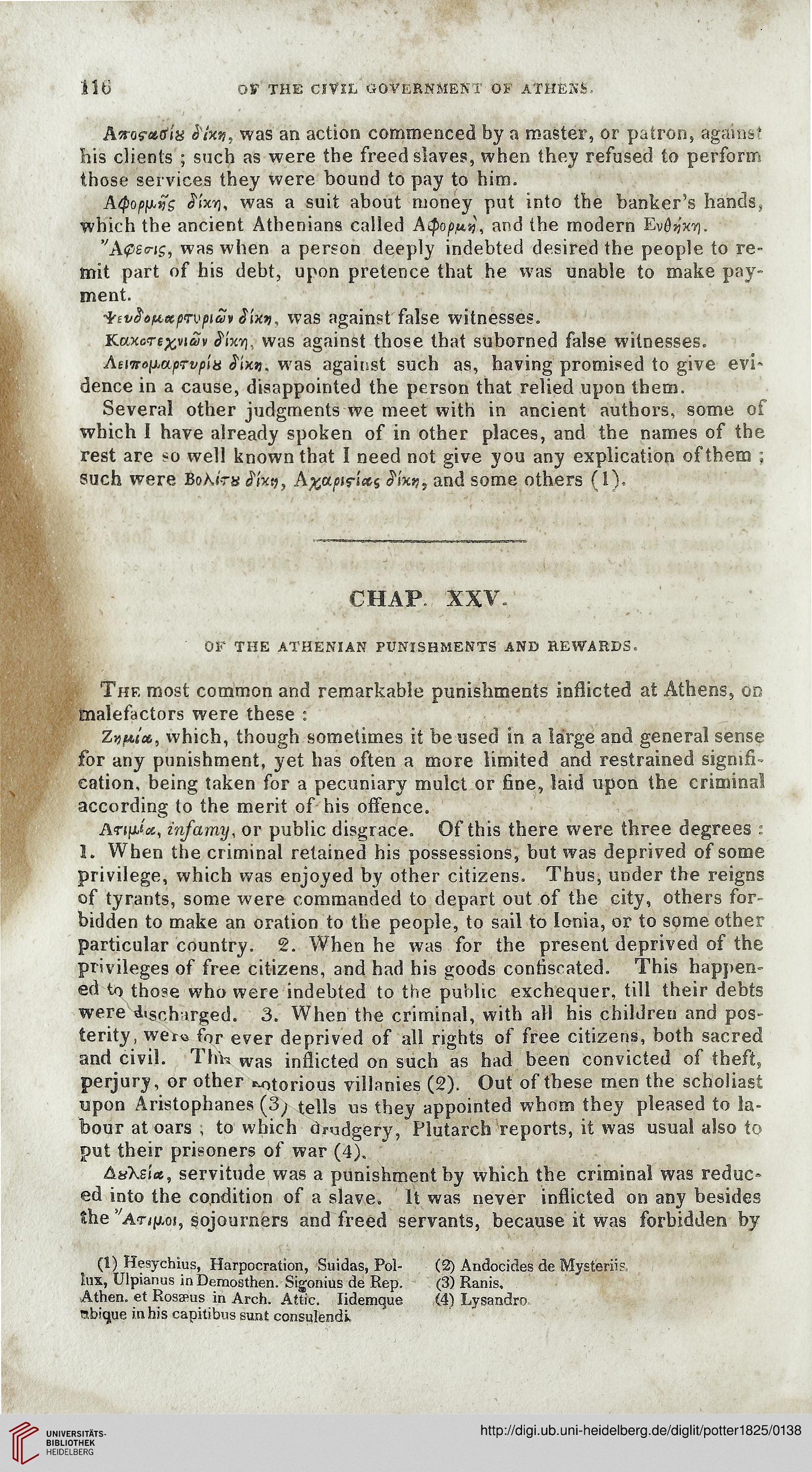os- the civil government of athens.
Awo?ct<f'i8 ilxti, was an action commenced by a master, or patron, agains*
his clients ; such as were the freed slaves, when they refused to perform
those services they were bound to pay to him.
AQopntig J'l'xr), was a suit about money put into the banker's hands,
which the ancient Athenians called Atyopnv, and the modern Ev^jj'xt).
"A<psa-\g, was when a person deeply indebted desired the people to re-
mit part of his debt, upon pretence that he was unable to make pay-
ment.
■kivde/Axprvpia* Sixy, was against false witnesses.
KaxcT£^vi»v i'ixv), was against those that suborned false witnesses.
At\n6^apTvpln £ix>i. was against such as, having promised to give evi-
dence in a cause, disappointed the person that relied upon them.
Several other judgments we meet with in ancient authors, some of
which I have already spoken of in other places, and the names of the
rest are ^o well known that I need not give you any explication of them ;
such were Bohirx J'/xtj, A;gafi$-i'<es $>x>), and some others (1).
CHAP XXV.
of the athenian punishments and rewards.
I The most common and remarkable punishments inflicted at Athens, on
malefactors were these :
Zyfttx, which, though sometimes it be used in a large and general sense
for any punishment, yet has often a more limited and restrained signifi-
cation, being taken for a pecuniary mulct or fine, laid upon the criminal
according to the merit of his offence.
Ariii'oi, infamy, or public disgrace. Of this there were three degrees :
1. When the criminal retained his possessions, but was deprived of some
privilege, which was enjoyed by other citizens. Thus, under the reigns
of tyrants, some were commanded to depart out of the city, others for-
bidden to make an oration to the people, to sail to Ionia, or to some other
particular country. 2. When he was for the present deprived of the
privileges of free citizens, and had his goods confiscated. This happen-
ed to those who were indebted to the public exchequer, till their debts
were discharged. 3. When the criminal, with all his children and pos-
terity, wet« for ever deprived of all rights of free citizens, both sacred
and civil. Thh was inflicted on such as had been convicted of theft,
perjury, or other *x,torious villanies (2). Out of these men the scholiast
upon Aristophanes (3; tells us they appointed whom they pleased to la-
bour at oars ; to which drudgery, Plutarch reports, it was usual also to
put their prisoners of war (4).
Atikeict, servitude was a punishment by which the criminal was reduc-
ed into the condition of a slave. It was never inflicted on any besides
the vA<nfjioi, sojourners and freed servants, because it was forbidden by
(1) Hesychius, Harpocration, Suidas, Pol- (2) Andocides de Mysterii?
lux, Ulpianus in Demosthen. Sigonius de Rep. (3) Ranis.
Athen. et Rosa>us in Arch. Attic. Iidemque (4'! Lysandro,
nbicjue in his capitibus sunt consulendk
Awo?ct<f'i8 ilxti, was an action commenced by a master, or patron, agains*
his clients ; such as were the freed slaves, when they refused to perform
those services they were bound to pay to him.
AQopntig J'l'xr), was a suit about money put into the banker's hands,
which the ancient Athenians called Atyopnv, and the modern Ev^jj'xt).
"A<psa-\g, was when a person deeply indebted desired the people to re-
mit part of his debt, upon pretence that he was unable to make pay-
ment.
■kivde/Axprvpia* Sixy, was against false witnesses.
KaxcT£^vi»v i'ixv), was against those that suborned false witnesses.
At\n6^apTvpln £ix>i. was against such as, having promised to give evi-
dence in a cause, disappointed the person that relied upon them.
Several other judgments we meet with in ancient authors, some of
which I have already spoken of in other places, and the names of the
rest are ^o well known that I need not give you any explication of them ;
such were Bohirx J'/xtj, A;gafi$-i'<es $>x>), and some others (1).
CHAP XXV.
of the athenian punishments and rewards.
I The most common and remarkable punishments inflicted at Athens, on
malefactors were these :
Zyfttx, which, though sometimes it be used in a large and general sense
for any punishment, yet has often a more limited and restrained signifi-
cation, being taken for a pecuniary mulct or fine, laid upon the criminal
according to the merit of his offence.
Ariii'oi, infamy, or public disgrace. Of this there were three degrees :
1. When the criminal retained his possessions, but was deprived of some
privilege, which was enjoyed by other citizens. Thus, under the reigns
of tyrants, some were commanded to depart out of the city, others for-
bidden to make an oration to the people, to sail to Ionia, or to some other
particular country. 2. When he was for the present deprived of the
privileges of free citizens, and had his goods confiscated. This happen-
ed to those who were indebted to the public exchequer, till their debts
were discharged. 3. When the criminal, with all his children and pos-
terity, wet« for ever deprived of all rights of free citizens, both sacred
and civil. Thh was inflicted on such as had been convicted of theft,
perjury, or other *x,torious villanies (2). Out of these men the scholiast
upon Aristophanes (3; tells us they appointed whom they pleased to la-
bour at oars ; to which drudgery, Plutarch reports, it was usual also to
put their prisoners of war (4).
Atikeict, servitude was a punishment by which the criminal was reduc-
ed into the condition of a slave. It was never inflicted on any besides
the vA<nfjioi, sojourners and freed servants, because it was forbidden by
(1) Hesychius, Harpocration, Suidas, Pol- (2) Andocides de Mysterii?
lux, Ulpianus in Demosthen. Sigonius de Rep. (3) Ranis.
Athen. et Rosa>us in Arch. Attic. Iidemque (4'! Lysandro,
nbicjue in his capitibus sunt consulendk




